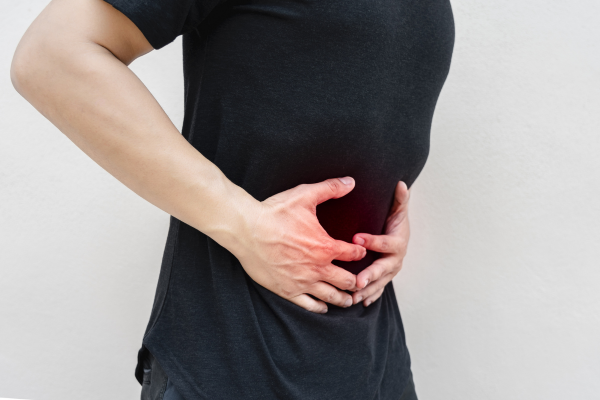Microscopic Colitis, Gut Health, and Collagen

The connection between microscopic colitis, gut health, and collagen
Microscopic colitis is a relatively uncommon but potentially serious inflammatory bowel disease that can cause long-term diarrhea, abdominal pain, and a range of other unpleasant symptoms. Despite the microscopic nature of the disease – meaning it is not visible during routine endoscopic examination and can only be diagnosed through tissue sampling and microscopic examination – it can have major effects on gut health. An important aspect of microscopic colitis is its impact on the structure and function of the gut wall, which is closely linked to collagen. Collagen is a structural protein that plays a crucial role in the tissues of the gut and its ability to repair damage and maintain an intact barrier. This article examines the relationship between microscopic colitis, gut health, and collagen, and how these factors interact to influence the course of the disease and treatment.
1. What is Microscopic Colitis?
Microscopic colitis is an inflammatory bowel disease characterized by chronic diarrhea, abdominal pain, and sometimes weight loss and fatigue. The disease most often affects middle-aged adults, but can also occur in other age groups. The exact cause of microscopic colitis is not yet fully understood, but research suggests that the immune system plays a central role in the development of the disease.
There are two main types of microscopic colitis: lymphocytic colitis and collagenous colitis . Both forms are characterized by inflammation of the intestinal lining, but they differ at the microscopic level. Lymphocytic colitis is characterized by an increase in lymphocytes (a type of white blood cell) in the intestinal lining, while collagenous colitis is characterized by a thickening of the collagen layer beneath the intestinal epithelial cell layer.
2. Gut Health and Microscopic Colitis
Gut health plays a fundamental role in the development and progression of microscopic colitis. The intestinal mucosa and the barrier it forms are important for protecting the body from harmful substances and pathogens. When gut health is disrupted, inflammation can occur, which in turn leads to various gastrointestinal symptoms and impaired bowel function.
Structure and Function of the Intestine
The intestine has a very complex structure consisting of several layers, where the mucosa (the innermost surface) plays a central role in both digestion and immune defense. An intact intestinal barrier is crucial in preventing harmful microorganisms and toxins from penetrating the intestinal wall and entering the bloodstream. This barrier is maintained intact by an interaction between the cells of the intestinal epithelium and the structural proteins, including collagen, which give the tissue its strength and stability.
In microscopic colitis, inflammation causes changes in this barrier. Inflammation of the intestinal lining leads to increased permeability of the intestine, which can result in leaky gut. This allows harmful substances, bacteria, and toxins to pass through the intestinal wall and into the bloodstream, increasing the risk of systemic inflammation and other health problems.
Microscopic Colitis and the Intestinal Barrier
A central aspect of microscopic colitis, particularly in collagenous colitis, is changes in the structural components of the intestine, including collagen. Collagen is a protein network that acts as a “support” for the intestinal wall and provides strength and elasticity. In collagenous colitis, it is specifically the collagen layer beneath the epithelial cells that is altered. Thickening of this collagen layer causes the intestinal barrier to become stiffer and less flexible, which can affect the intestine’s ability to absorb nutrients and prevent the leakage of harmful substances.
3. The Role of Collagen in Gut Health
Collagen is the most abundant protein in connective tissue and plays a central role in the structural integrity of the body. There are several types of collagen, and the most relevant to intestinal health are collagen types I and III, which are found in connective tissue and under the intestinal epithelium. Collagen forms a network of fibers that provide strength and elasticity to the intestinal wall. In microscopic colitis, especially in collagenous colitis, changes in collagen structure are one of the most obvious pathological features.
Collagen and Gut Integrity
Collagen contributes to the structure of the intestine by creating a supportive network of fibers that make the intestinal wall strong and flexible. When the intestinal mucosa and connective tissue function normally, collagen acts as an effective barrier that prevents pathogens and other harmful substances from entering the bloodstream. In microscopic colitis, collagen production can be disrupted, leading to changes in the structure of the intestine and a weakened barrier function.
In collagenous colitis, the collagen layer beneath the epithelial cells thickens. This can cause stiffness in the intestinal wall, making it more difficult for the intestine to carry out its normal functions, such as absorbing nutrients and transporting waste. The thickening of collagen can also make the intestine more susceptible to injury and lose its flexibility, which in turn can lead to further inflammation and damage to the intestinal tissues.
Collagen and Inflammation
Another important aspect of collagen in gut health is its interaction with inflammation. In microscopic colitis, inflammation causes changes in the intestinal tissue, leading to increased collagen production in certain areas. Inflammation can also affect the structure of collagen, making it more prone to forming scar tissue and causing fibrosis (scarring). Fibrosis can impair intestinal function and lead to strictures that block the passage of the intestine, which can cause pain, discomfort, and other complications.
Collagen's role in inflammation is twofold: it can both contribute to healing by repairing damaged tissue, but at the same time, if inflammation is prolonged or untreated, collagen can lead to excessive scarring and prevent intestinal function. This creates a balance where collagen production must be regulated to support healing without causing excessive fibrosis.
4. Microscopic Colitis, Collagen, and Autoimmunity
Microscopic colitis, like many other inflammatory bowel diseases, is believed to have an autoimmune origin. The immune system plays a central role in triggering and maintaining inflammation in the intestine. The immune system reacts against the intestine's own tissues, causing an inflammatory reaction. In the case of microscopic colitis, it is the intestinal mucosa and connective tissue that are affected by this immune reaction.
The Role of the Immune System in Microscopic Colitis
In microscopic colitis, the immune system is activated in the intestinal tissues, leading to an increased production of inflammatory mediators such as cytokines and chemokines. These substances cause a cascade of inflammatory reactions that damage the intestinal mucosa and contribute to increased permeability of the intestinal barrier. This inflammation affects collagen production, leading to changes in the structure of the intestine, especially in the collagen layer.
Autoimmunity and Collagen
Because microscopic colitis is an autoimmune disease, it means that the immune system mistakenly identifies the body's own tissues as a threat and attacks them. Collagen, which is part of the connective tissue in the intestine, can become a target for the immune system. This can result in an overproduction of collagen in an attempt to repair the damaged tissue, but also in an increased risk of fibrosis and strictures in the intestine.
The impact of autoimmunity on collagen is important to understand because it is not only a matter of damage to the structure of the intestine but also a potential obstacle to the healing process. If the immune system continues to produce inflammatory mediators, this can result in a chronic cycle of inflammation and damage leading to excessive collagen production and fibrosis.
5. Treatment and Management of Microscopic Colitis
Treatment for microscopic colitis aims to reduce inflammation, relieve symptoms, and prevent complications that can arise from damage to the intestine and collagen production. Treatments include both medical treatment and lifestyle changes.
Medical Treatment
The most common treatment options for microscopic colitis include:
-
Corticosteroids : Used to suppress inflammation and reduce symptoms during acute phases.
-
Immunomodulatory drugs : These drugs are used to regulate immune system activity and reduce inflammation.
-
Biologic drugs : For severe cases, biologic drugs such as TNF-alpha inhibitors may be used to block specific molecules that drive inflammation.
-
Loperamide : A medication used to relieve diarrhea, which is a common symptom of microscopic colitis.
Diet and Lifestyle Changes
A nutritious diet is essential to support gut health and healing. Eliminating foods that can exacerbate inflammation, such as fatty foods or gluten, can be beneficial. A diet rich in fiber, vitamins, and minerals is also important to support gut function and collagen production. It is also important to manage stress, as it can affect gut health and worsen inflammation.
Conclusion
The relationship between microscopic colitis, gut health, and collagen is complex and involves multiple biological processes. Collagen plays a central role in providing strength and structure to the gut, but in microscopic colitis it can also contribute to inflammation and fibrosis, which affects the gut’s function and ability to recover. Understanding this balance and implementing treatment strategies that reduce inflammation and support gut healing are crucial to managing microscopic colitis.






